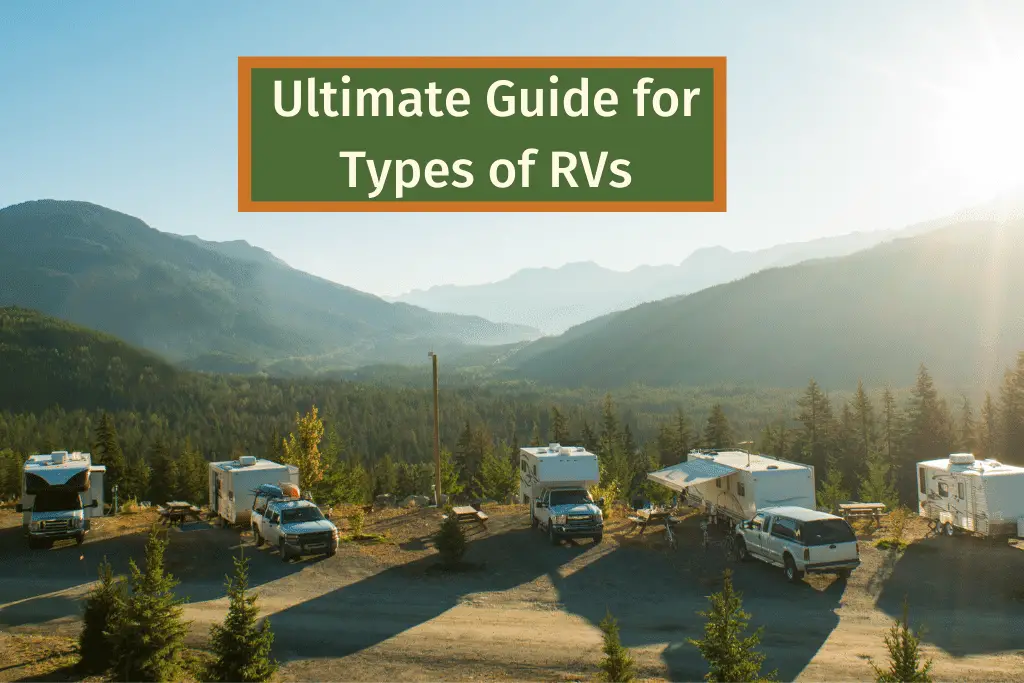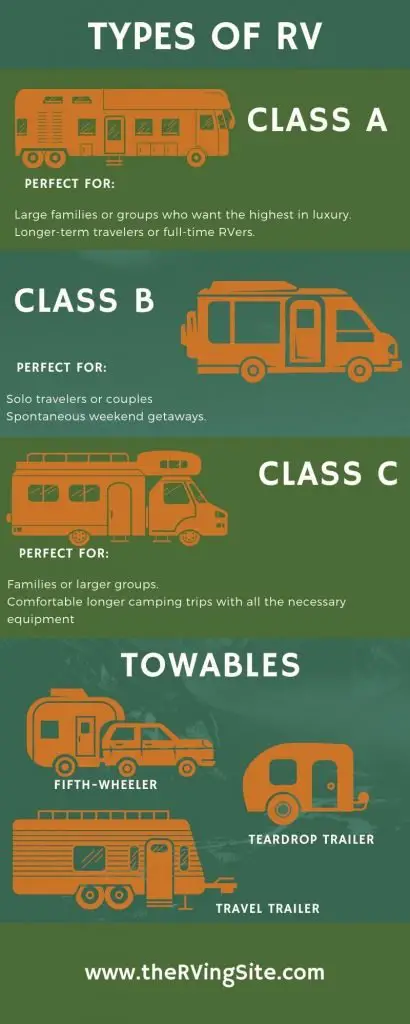In this guide I will lay out all the different types of RVs and motorhomes along with their pros and cons. This will help you pick the right RV for your perfect trip, whether by yourself or with your loved ones.
I remember when I first entered the world of RVing, there was so much choice I didn’t know where to start, it was completely overwhelming. This guide was put together after years of research and travelling in various RVs.
I will detail and highlight the differences in the classes of RVs (A,B and C) and also discuss campervans, 5th wheel trailers, sport utility/ toy trailers, truck campers, pop up campers, travel trailers, and teardrop trailers.
RVs provide freedom! There’s nothing better than the feeling that the world is your oyster 🙂
You can go anywhere and have whatever adventures take your fancy.
The last thing that you want is to be overwhelmed by selecting the right RV type before you even get started. So let’s get into it and get you your perfect camper!
Drivable Vs Towable
Before we go into detail about the specific types of RVs there are two general categories: Drivable (Motorized) and Towable. This is the first decision that you’ll have to make, do you want a motorized RV or a towable RV?
Drivable RV
As you’ve probably figured, the drivable RV (often called a motorhome) is an all in one a.k.a they have engines. These are the the RVs that first come mind, when you think of a motorhome. They do have their downsides though so it’s important to weigh everything up when deciding.
Pros
- The RV is all in one – thus you only have one thing to manage and maintain.
- Easy access to the whole of the RV at all times – washroom, snacks, etc.
- Easier and faster setup on campgrounds.
- No need to tow anything.
Cons
- If the RV has to go in for repairs you’re stuck without accommodation and transportation.
- These RVs come with the highest price tag.
- Poor fuel economy – higher gas bills.
- Repair costs can be higher than a towable.
- Smaller roads may be out of bounds.
- No car.
Whilst the thought of a drivable RV is appealing, there are some downsides to consider.
Towable RV
An alternative to the motorhomes are the towable RVs, there are lots of variety of towables out there which are discussed below. They generally consist of fifth-wheels, travel trailers, pop ups, toy haulers and teardrop trailers. There is a complete guide to the best RV travel trailer brands on this site. Again they have their ups and downs so here’s a quick pros and cons for you to contemplate.
Pros
- Less expensive than the motorized RVs.
- More variety in size and facilities than the motorized options.
- You don’t have to travel everywhere in your RV.
- Cheaper fuel costs.
- Easier to repair – less chance of your accommodation being held up in the shop for repairs.
- They are easier to customize
Cons
- Tow vehicles usually need to be big and thus expensive.
- You have to have a tow vehicle as well as an RV.
- Longer to set up and takedown at campsites.
- Towing can be difficult for some drivers to get to grips with.
Again towables have their pros and cons to consider.
Now let’s get to the juicy part – RV Classes and types.
First we’ll start with the motorized RV classes:
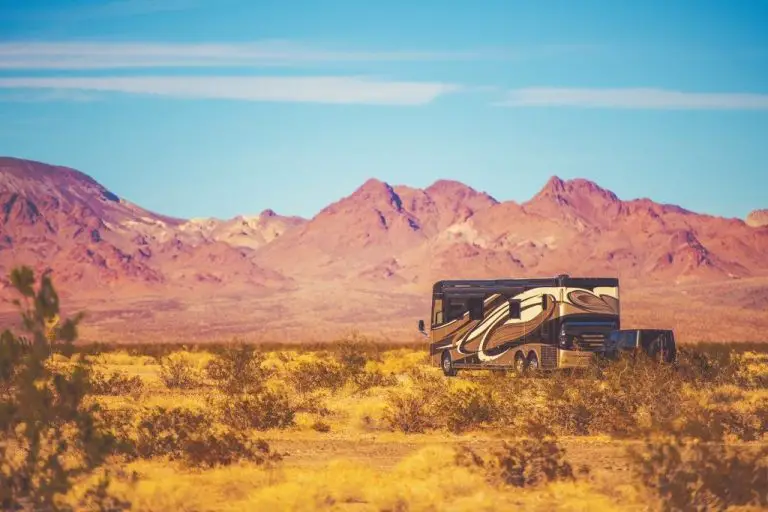


Class A Motorhomes
Class A motorhomes are the most prestigious of all the RV family – often called the ‘King of the Campground’. These RV’s scream luxury and style.
Ranging from 21 to 45 feet and weighing more than 20,000 pounds, these bad boys are the largest of them all. Most of them have enough space to rival the standard apartment!
These motorhomes are the height of luxury and have large living areas and bedrooms. Some come with slide-out sections that expand the living space further. You can expect fully functional kitchens with all the modern appliances. Some even have a ‘basement’ area for you to store your sports car 🙂
Maneuvering these beasts can be tricky, especially if you’re a beginner. It might be worth considering towing your car along so you can get around easier once you’ve reached your destination.
Naturally, these RVs are expensive, not only is the initial cost higher but they are generally more expensive to repair as they have complex electronics. They will also cost a small fortune in gas.
If you want luxury and comfort in your motorhome, they don’t come much better than Class A.
The Class A is at the top of the RV pyramid, however, they can be impractical or out of reach for many.
Pros:
- Large, comfortable, and luxurious living areas
- Tons of storage
- Lots of high specification amenities
- Good for long-term living – can be better than some apartments.
Cons:
- Very expensive – to buy, repair, fuel, and insure.
- Hard to maneuver on the road and to park.
- May need to tow a car for taking day trips or running errands.
- You might need a special license for the largest RVs in some states.
Perfect For:
- Large families or groups who want the highest in luxury.
- Longer-term travelers or full-time RVers
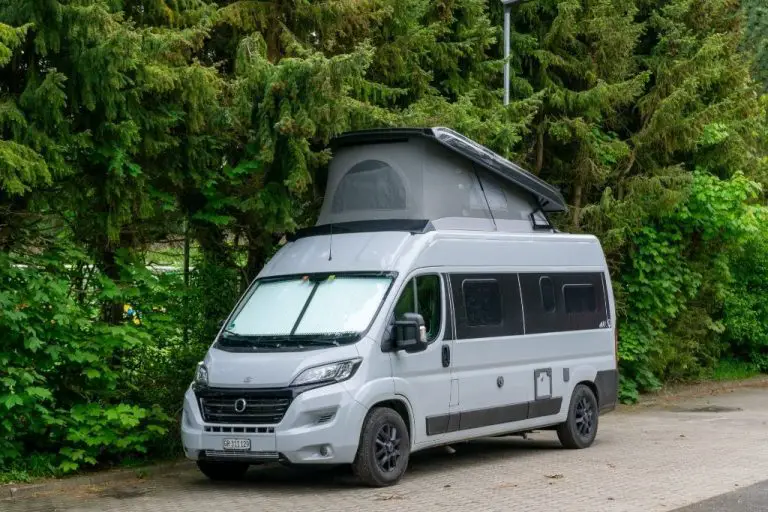


Class B Motorhomes
Class B motorhomes are the smallest of the motorized RVs they’re also known as ‘campervans’. It’s easy to see why as they are usually built on a van chassis, with a raised roof. They look and drive much like a van.
Because of their smaller size (21 to 24 feet), they are easier to drive, you’ll be fine using the campervan to pop to the shops and run errands.
Class B’s can get quite ingenious with their design space, often converting the dining area into a queen-size bed. They can also combine the shower, sink, and toilet into a wet room.
Campervans are ideal for solo travelers or couples – trust me although you can technically sleep 4 you don’t want to. Unless you’re extremely comfortable with those other 3 people.
Pros:
- Most affordable motorized RV – to buy, fuel and repair.
- Easy to drive and maneuver
- Easy to set up at campsites.
Cons:
- Small living space
- Less storage
- Fewer amenities
Perfect For:
- Solo travelers or couples
- Spontaneous weekend getaways.
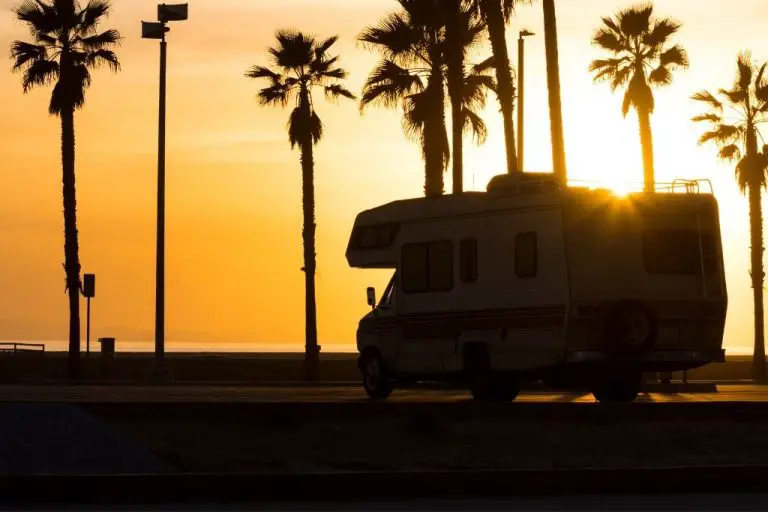


Class C Motorhomes
The Class C is the mid-sized RV, they are halfway between class A and B. Built on an existing truck and van chassis they range between 20 and 30 feet. They usually feature an over cab bed, which makes these easier to spot.
They have larger living areas and more amenities than class B, and can sleep a larger group. Although they’re not as big as the Class A’s they can be challenging to drive and will be difficult to use to run errands or go for day trips.
These are excellent options for families with children, or for those who want the comfort of a class A but without the price tag.
Pros
- Large living and sleeping areas – enough for an entire family
- Extra sleeping or storage area above the driver’s cab
- Lots of amenities
- Self-contained
- Less expensive than Class A (and some Class B’s)
- Easier to drive than Class A
Cons
- Expensive to run and repair
- Driving can be difficult still
- Less luxurious than the Class A
Perfect For:
- Families or larger groups.
- Comfortable longer camping trips with all the necessary equipment



Campervans
I know – technically we covered campervans in the class B section. However, we can’t have a list about RVs without specifically calling out the classic VW Camper.
These cute hippy campers are typically what come to mind when you think of campervans. They are the no-frills version of the Class B.
They have a compact cooking area, convertible dining/sleeping area, and typically no bathroom or washing facilities.
These are great for weekend trips to campsites for couples or single travelers.
Pros:
- Easy to drive
- Timeless style
Cons:
- Small space
- Insurance and repairs can be expensive for older models
- Limited amenities
Perfect For:
- Solo travelers or couples
- Spontaneous weekend getaways.
Towable RVs
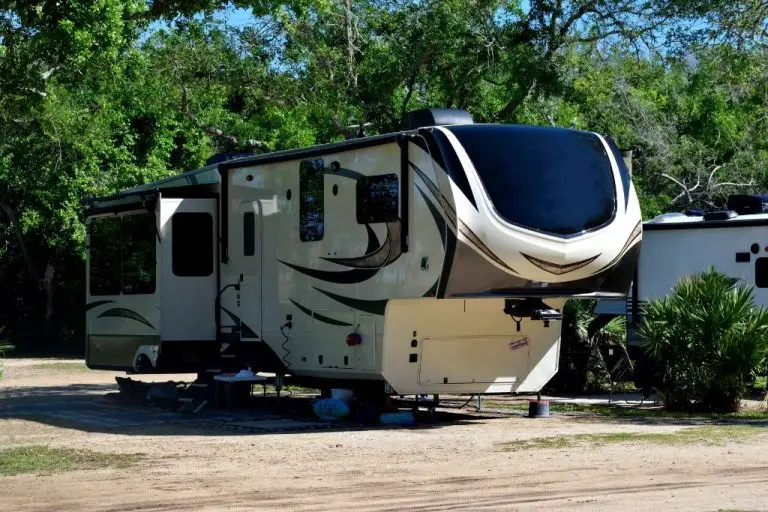


Fifth-Wheel Trailers
We’re starting this list with style! The Fifth-wheel trailers are the Class A’s of the towable RVs. And as such, they are also the most expensive, but they also pack in a lot of luxury. Many 5th Wheel trailers also have slide-outs that offer extended living areas. There is also the overhanging section which can offer multi-level living.
Fifth-wheel trailers are big (20 to 40 feet) and thus need to be towed by a large pickup truck or conversion vehicle. They are attached to the towing vehicle via a gooseneck connector. The gooseneck adapter connects from the bed of the truck to the bottom of the overhanging section of the trailer. This allows for easier maneuvering and a stronger connection than traditional towing.
Whilst there is ample living area inside the trailer, you need to factor in how many passengers you can fit in your towing vehicle. It’s illegal for passengers to be onboard the trailer whilst it’s being towed. This may be a limitation for some families.
Pros:
- Better connection using the gooseneck adapter
- Spacious multi-level living quarters and storage space
- Lots of amenities and modern conveniences
- Can be unhitched, which frees up the towing truck for day trips and errands
- Cheaper than the motorized version.
Cons:
- Requires a large towing vehicle
- Limited passengers on long trips
- Can be intimidating to drive
Perfect For:
- Larger families or groups (with own transport)
- Luxurious RV experience
- Confident drivers.
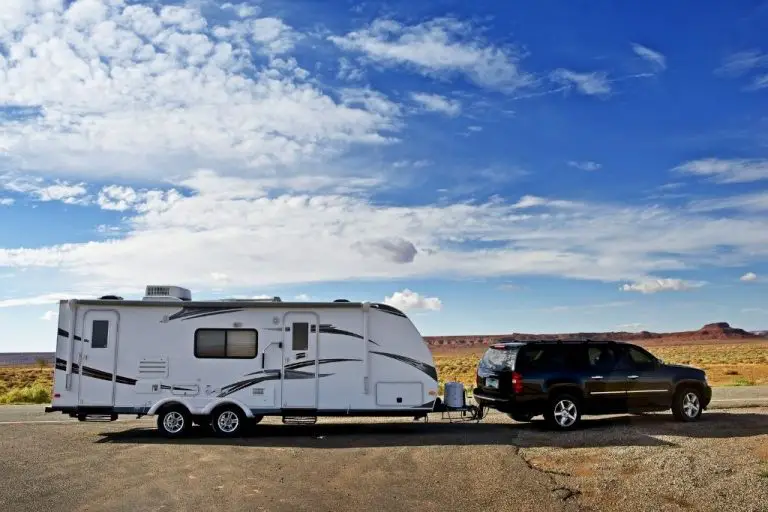


Travel Trailers
This is probably the most diverse group of RVs, travel trailers come in all sorts of shapes and sizes. They can be small with enough room for a mattress to a fully equipped luxurious trailer with a kitchen, bathroom, and all the modern conveniences.
Probably the best aspect of the travel trailer is that the towing vehicle can vary as much as the trailer. They are towed via the standard ball hitch receiver so as long as your vehicle can tow the weight of the RV then there’s no need to buy a special towing vehicle.
As with the fifth-wheel trailers, it’s illegal for passengers to travel in the trailer whilst in motion, so make sure the towing vehicle can accommodate the passengers.
Unfortunately maneuvering with the trailers can be difficult, and even the most experienced drivers struggle with reversing when the trailer attached. Tail swing can also be an issue whilst traveling, so make sure to check the weather conditions and avoid high winds.
Pros
- Can be unhitched, which frees up the towing truck for day trips and errands
- Cheaper than the motorized version.
- Lots of variety and layouts available
- Can be towed with a variety of different vehicles
Cons
- Difficult to maneuver in tight areas and reversing is near impossible
- Tail swing can be an issue
- Limited passengers on long trips
Perfect For:
- Larger families or groups (with own transport)
- There are so many variations of the travel trailer, you are pretty much guaranteed to find one that suits your needs.
- Confident drivers.
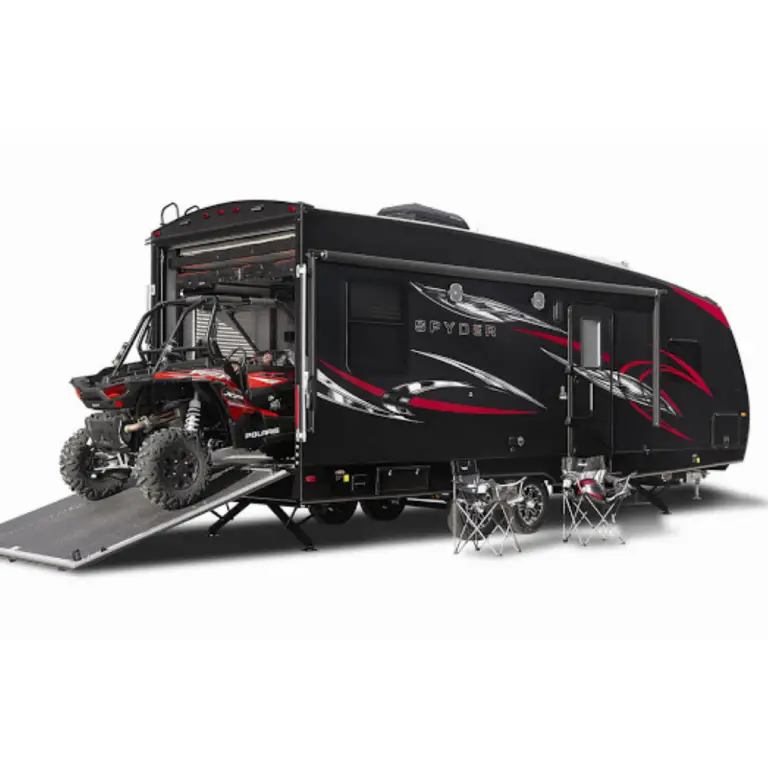


Sport-Utility/ Toy Trailers
Sport Utility Trailers (SUTs) or ‘toy haulers’ are designed with outdoor enthusiasts in mind. They are ideal if you want to bring your dirt bike, ATV, snowmobile, or whatever ‘toy’ you have. The back of the trailer is used for storing your toy, and has a pull-down ramp. The front of the trailer is typically the living space.
This RV is a great choice for people who want to take part in motorsports whilst camping in a comfortable RV. They have the same basic amenities as the travel trailers, whilst still having space to store your ‘toy’, tools, and equipment.
Because there is a garage in the trailer it does mean that the living area inside can be smaller. Also, it may not be appealing if some of the other campers are not as enthusiastic about motorsports.
Again they have the same problem as the other towable RV’s in that they are subject to tail swing, hard to maneuver, and have limited space for passengers. But they are a fantastic option if you want to take your motor vehicle on holiday with you.
Pros
- Dual purpose
- The living area can have all the desired appliances and amenities
Cons
- Less living space due to the dual function
- Smells and chemicals from the garage area could affect the living area
- Difficult to maneuver in tight areas and reversing is near impossible
- Tail swing can be an issue
- Limited passengers on long trips
Perfect For:
- Families or couples
- Outdoor enthusiasts who have their own motorsport vehicle
- Confident drivers
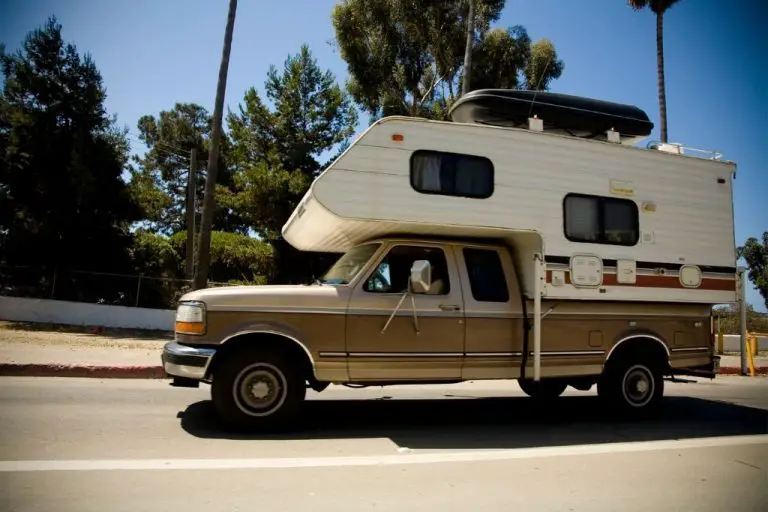


Truck Campers
These RVs are designed to fit on the back of a pickup truck. Truck campers are easy to drive and can pack a lot of amenities into a tight space. They typically have cooking, bathing, sleeping, and dining facilities.
They are perfect for RVers who want to just pick up and go.
Pros:
- Affordable to buy, insure and repair
- Easy to drive and maneuver
- Great for off-roading — a good “go anywhere” vehicle
- A removable shell means you can continue to use your truck as normal
Cons:
- Small living area
- Very limited amenities
- Must have a specific truck model to match the camper
Perfect For:
- Solo travelers or couple
- Spontaneous weekend getaways
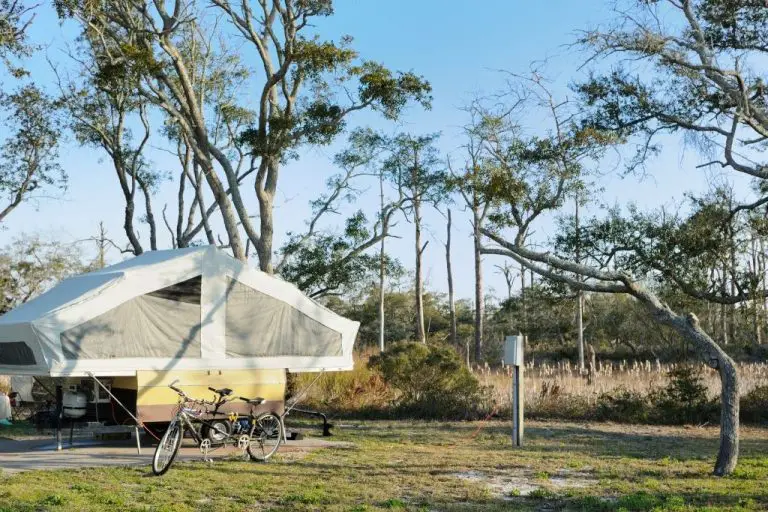


Pop-Up Campers
Pop-up campers are also known as ‘Folding campers’ or tent trailers are some of the smallest towable RVs on the market. When at the camping ground they have expanding compartments that pull out to give a good-sized living area.
Some have a folding hard composite shell and some have a durable canvas tent that extends out. The base section usually has seating and a cooking area, and the canvas section is pulled out to contain the sleeping area. Because they are so small and lightweight they don’t offer much in the way of luxury. But, they will have the essentials that will make a camping trip really enjoyable.
Pop-up campers are great for occasional use, as they are lightweight and small enough to be easily maneuvered. Because they are so lightweight there is a large variety of towing vehicles that can be used.
These are great for newbies who want an inexpensive way to test the water, and get a step up from tents.
Pros
- Easy to maneuver
- Lightweight so has a wide range of possible towing vehicles
- Cheap to buy and operate
Cons
- Limited interior space
- No storage space for supplies
- Folding hinges and canvas are prone to damage
- More exposure to the elements – not suited to extreme weather
Perfect For:
- Families or groups (with own transport)
- Newbie RVers
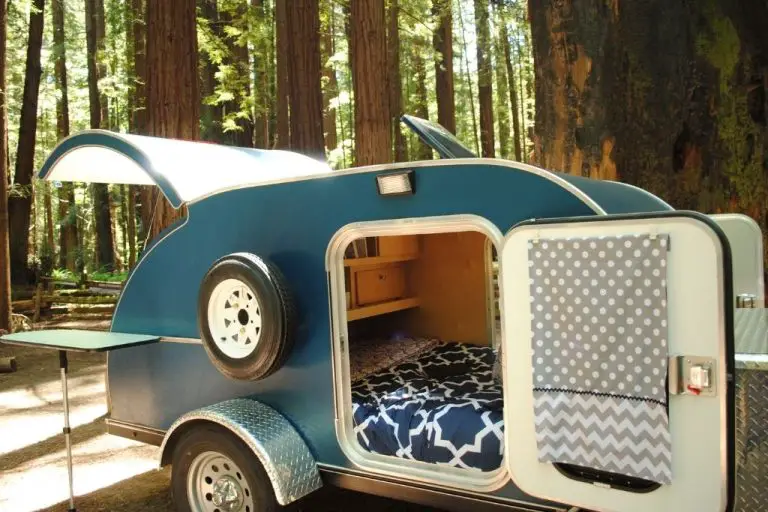


Teardrop Trailers
Teardrop trailers are easy to recognize as they are shaped like a teardrop – hence the name. These little trailers are great for couples or solo travelers who want to get away for the weekend. They come in a range of floorplans and some include, wet baths, kitchen/dining area, and sleeping area. Like the Class B’s they can really fit a lot into a small space.
These trailers are lightweight and so can be towed by a large variety of vehicles and are easy to move and look after.
Pros
- Easy to maneuver
- Lightweight so has a wide range of possible towing vehicles
- Affordable to buy and operate
Cons
- Small living area
- Limited amenities
Perfect For:
- Solo travelers or couples
- Weekend getaways
Final Thoughts
When it comes to RV’s there are many options available, you need to consider what’s most important to you. Your RV will be as unique as you.
Buying an RV is a big investment and you want to get it right. I’d strongly recommend renting the RV model you are looking at first, to see if it’s a good fit.

